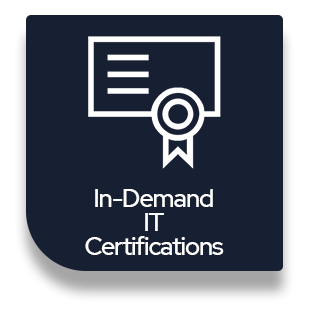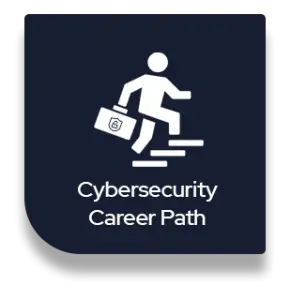IT Certifications can validate your skills and experience to show employers you have the expertise to get the job done. In addition, you can get certified in skills you already have or skills you’d like to put to use in your career — whatever your reason, certifications are a great way to strengthen your resume and set yourself apart from other candidates in a job search.
According to the 2021 IT Salary report from Robert Half, IT professionals holding the following popular certifications can earn 5% to 10% more than their peers. So whether you’re just starting and building your resume or you’ve been in the industry for 20 years, there’s a certification that can help boost your salary and your career.
The most in-demand certifications for 2021
- AWS Certified Solutions Architect – Professional
- Certified Cloud Security Professional (CCSP)
- Certified Ethical Hacker (C|EH)
- Certified Information Security Manager (CISM)
- Certified Information Systems Security Professional (CISSP)
- Cisco Certified Internetwork Expert (CCIE)
- Cisco Certified Network Associate (CCNA)
- Cisco Certified Professional Network Professional (CCNP)
- Microsoft Certified Azure Solutions
- Project Management Professional (PMP)
AWS Certified Solutions Architect – Professional
Amazon offers a long list of AWS certifications, but the AWS Certified Solutions Architect is one of the most popular cloud computing certifications you can earn. AWS is widely used at companies large and small, so whether you already work for a company using AWS or plan to in the future, it’s a good choice for your resume. The certification focuses on your ability to design and deploy scalable systems on AWS, focusing on keeping it cost-effective without sacrificing security, reliability, and quality.
Certified Cloud Security Professional (CCSP)
The Certified Cloud Security Professional (CCSP) certification is offered through the International Information System Security Certification Consortium (ISC)². The certification demonstrates your knowledge and abilities when designing, managing, and securing data, applications, and infrastructure in the cloud. It’s intended for cloud technology professionals, including enterprise architects, security administrators, systems engineers, security architects, systems architects or consultants, engineers or managers. The certification exam covers cloud concepts, architecture, design, security and risk, and compliance. While not required, the (ISC)² recommends having at least five years of experience in IT, with at least three years in information security and one year in one or more of the six domains found in the CCSP CBOK.
Certified Ethical Hacker
Offered through the EC-Council, the Certified Ethical Hacker (C|EH) certification demonstrates your ability to find vulnerabilities in computer systems and prevent hacking. As an ethical hacker, you’re someone who uses the same skills, techniques, and knowledge as a malicious hacker to help establish better security measures to prevent future attacks. Ethical hackers are responsible for finding weaknesses in the organization’s networks and systems and then use that knowledge to protect the company against potential threats.
Certified Information Security Manager (CISM)
The ISACA’s Certified Information Security Manager (CISM) certification covers information security governance — a topic that is a growing concern for businesses globally. The certification is designed for IT pros who work with or manage IT security and want to demonstrate their expertise in information security governance, information risk management, information security program development, and management and information security incident management. It’s recommended to have experience in IS or IT security — the certification is aimed at those working in IT who have an eye on the management track.
Certified Information Systems Security Professional (CISSP)
The Certified Information Systems Security Professional (CISSP) certification offered through the (ISC)² demonstrates your IT security and information assurance knowledge and abilities. The certification covers the organizational structure, security and risk management, asset security, security operations, identity and access management (IAM), security assessment and testing, and security architecture and engineering. You’ll need at least five years of cumulative, paid work experience in two or more of the eight domains included in the (ISC)² CISSP Common Body of Knowledge (CBK). You may be able to satisfy one year of experience with a relevant four-year college degree or if you hold an approved credential.
Cisco Certified Internetwork Expert (CCIE)
The Cisco Certified Internetwork Expert (CCIE) certification is the highest level of certification you can reach in Cisco’s program. The expert-level certifications are offered in specialty areas, including enterprise infrastructure, enterprise wireless, data center, security, service provider, and collaboration. Once you have passed your CCIE exam in your topic of choice, you will have reached the highest level of Cisco certification currently available. Before you can earn your expert-level certification, it’s recommended to have at least five to seven years of experience in the certification subject.
Cisco Certified Network Associate (CCNA)
The Cisco Certified Network Associate (CCNA) certification is offered in several specializations, including security, wireless, routing and switching, industrial, IoT, data center, cyber operations, collaboration, and cloud. The exam covers network fundamentals, network access, IP connectivity, IP services, security fundamentals, and automation and programmability. To pass the exam, you’ll need at least one year of experience working with Cisco products and services, basic knowledge of IP addressing, and a strong understanding of network fundamentals.
Cisco Certified Network Professional (CCNP)
The Cisco Certified Network Professional (CCNP) certifications will be the next step on your Cisco certification journey after you earn your CCNA. With CCNP, you can choose to be certified in the enterprise, data center, security, service provider, collaboration, CyberOps, or DevNet. You’ll need to pass an exam at the CCNP level to move to the final expert level of certifications. It’s recommended to have at least three to five years of experience in any certification path you choose.
Microsoft Certified Azure Solutions
The Microsoft Certified Azure Solutions Certification is designed for cloud professionals responsible for advising stakeholders and building reliable cloud solutions for the business. The expert-level exam covers your skills and knowledge when deploying and configuring infrastructure, implementing workloads and security, and creating and deploying apps. The exam also covers topics such as designing a data platform solution, business continuity and infrastructure strategy, and how to develop for the cloud. You’ll need to know how to determine workload requirements, design data platform solutions, create a business continuity strategy, and design for deployment, migration, and integration.
Project Management Professional (PMP)
The PMP certification is offered through Project Management Institute and is targeted at advanced project management professionals. The certification covers the fundamentals of project management, including the five main stages of a project’s life cycle: initiating, planning, executing, monitoring, controlling, and closing. To take the exam, you’ll need at least a four-year degree and three years of experience in project management, 4,500 hours of leading and directing projects, and 35 hours of project management education. If you have a secondary degree, you’ll need five years of experience, 7,500 hours leading and directing projects, and 35 hours of project management education.
Salesforce Certified Development Lifecycle and Deployment Designer
The Salesforce Certified Development Lifecycle and Deployment Designer certification falls under Salesforce’s architect certifications track. This certification exam is offered as a specialization you can take under the Certified Systems Architect certification path. It’s designed for IT pros responsible for assessing the company’s architecture environment and requirements and certifies your ability to implement management solutions on the Salesforce platform.



